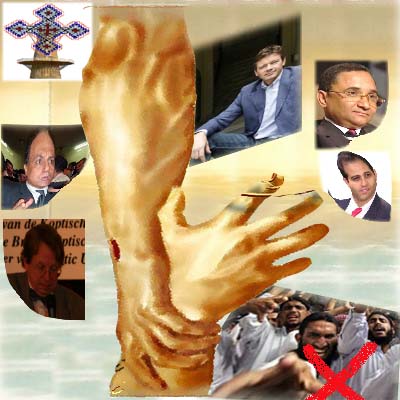Settling the Swiss account with the Copts
 Last week I wrote commenting on the caustic response of our media to the Swiss ban on building minarets. Even though I am absolutely against the curtailment of religious freedom in any way, I made it clear that Egyptians are in no position to criticise the Swiss since Copts in Egypt are treated far more abominably than Muslims in Switzerland. I tackled, one by one, the most flagrant criticism printed in our papers against the Swiss, and made a direct comparison with the situation of Copts in Egypt—a facet entirely overlooked by the wide majority of Egyptian critics of the Swiss ban. Since our house is of glass, I wrote, we should not be hurling stones at others.
Last week I wrote commenting on the caustic response of our media to the Swiss ban on building minarets. Even though I am absolutely against the curtailment of religious freedom in any way, I made it clear that Egyptians are in no position to criticise the Swiss since Copts in Egypt are treated far more abominably than Muslims in Switzerland. I tackled, one by one, the most flagrant criticism printed in our papers against the Swiss, and made a direct comparison with the situation of Copts in Egypt—a facet entirely overlooked by the wide majority of Egyptian critics of the Swiss ban. Since our house is of glass, I wrote, we should not be hurling stones at others.I thought I had thus closed the file of the Swiss ban, even though the controversy over it continued to rage. I find myself, however, obliged to return to the topic since the most recent response to the ban is ominously negative and opens an inflamed wound in the body of the Egyptian nation.
The telefax machine at Watani brought in a declaration from the Arab Socialist Party of Egypt (ASPE) signed by the party head Wahid al-Luxory. The declaration, which was the outcome of a seminar the party held to discuss the Swiss ban, came replete with allegations of the western conspiracy scenario against Muslims and Islam, condemnation of the action against the Islamic nation, and call for various retaliatory measures. It is not my intention to discuss the rationality or the effectiveness of the measures proposed, but I have to stop before one particular item which recommended a call for “holding a referendum in Islamic countries to ban crosses or bells on church buildings”.
Such a call involves a serious mixing up of papers and reflects a severely flawed political vision. That a political party in Egypt should call for measures against the Swiss such as a boycott for instance—regardless of whether or not such measures would be effective—is among its prerogatives. But it has no right whatsoever to call for the violation of the rights of Christians in Islamic countries—specifically Copts in Egypt—or their churches, crosses, or bells.
The ASPE ought to realise that Copts are full Egyptian citizens and that Egypt’s Constitution guarantees them freedom of belief and freedom to conduct their religious rites and build their churches in the manner they see fit. If the reality on the ground testifies to a curtailment of their constitutional rights we ought to be striving to repair the damage and confirm the citizenship rights of the Copts instead of making them pay for what the ASPE sees as Swiss mischief.
The association of Swiss minarets with Egyptian churches and the call to exact penalty against the Swiss by forcing it on Copts constitute gross foolhardiness on the part of a political party which supposedly realises the difference between political and mobster practices. This political party ought to realise that Copts are full Egyptian citizens and are not the subjects or slaves of their Muslims fellow citizens; they are not captives to be used by the party as hostages to settle irresponsible accounts.
Very sadly, the ASPE call is just another in a painful chain of recent practices against Copts which, left to spread without any firm legal action against them, have practically become popular culture—a fait accompli. By this I mean the violent attacks against Copts, their churches, property and businesses, as collective penalty in case one Copt commits a crime or mistake, or is even merely rumoured to have committed a crime or mistake. It appears that such criminal behaviour against Copts is no longer the sole domain of mobs or outlaws but has been adopted by a legitimate political party, and serves to open an unhealed wound in the body of the nation.
I always make a point, however, to draw my readers’ attention to both positive and negative practices alike. In this respect, I would like to mention, with all appreciation and gratitude, the stance adopted by Minister of Religious Endowments (Awqaf) Hamdi Zaqzouq. Dr Zaqzouq said: “Egypt’s Copts are no minority group; they are part of the national fabric and enjoy the same rights and duties as their Muslim counterparts. It is unacceptable that Copts should be slandered from the pulpits of mosques or that it should be hinted that they deserve poor treatment on account of the Swiss minaret ban. There is a very obvious difference between Switzerland or Europe’s Muslims who originated as immigrants, and Egypt’s Copts who are authentic Egyptians living in their homeland.”
I strongly protest the ASPE’s action, while I warmly welcome and appreciate Dr Zaqzouq’s announcement.




